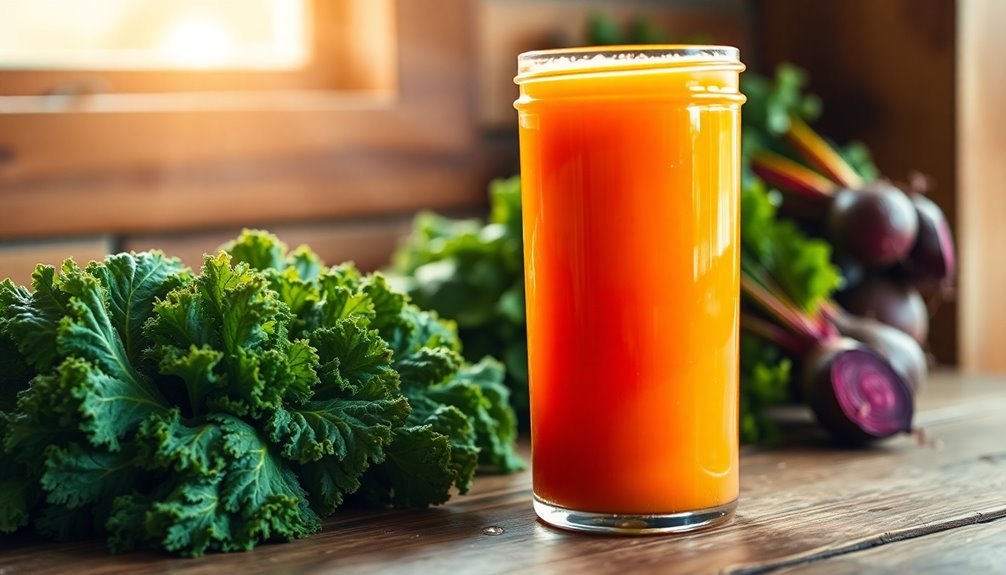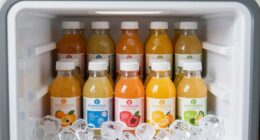Fresh vegetable juice lasts in the fridge for about 24 to 72 hours. For the best taste and maximum nutrients, consume it within the first 24 hours. If you use a masticating or twin-gear juicer, you might extend freshness up to 48 hours or even 4 to 5 days, respectively. Storing your juice in an airtight glass container and keeping it in a cool fridge can help. Want to know more about storage tips and techniques? To maintain the quality of your juice, it’s also advisable to fill the container to the brim to minimize air exposure, which can lead to oxidation. If you’re wondering how long does grape juice last compared to vegetable juices, commercially bottled grape juice can last much longer, often several weeks when unopened and stored properly. However, once opened, it should be consumed within a week to ensure freshness and flavor.
Key Takeaways
- Fresh vegetable juice lasts between 24 to 72 hours in the fridge, with optimal taste within the first 24 hours.
- Masticating juicers can keep juice fresh for about 48 hours, while twin-gear juicers extend it to 4-5 days.
- Storing juice in airtight glass containers minimizes oxidation and helps preserve quality.
- Refrigeration at 35-40°F (1.6-4.4°C) slows degradation and maintains freshness.
- Adding a splash of lemon juice can enhance preservation due to its higher acidity.
How Long Does Fresh Vegetable Juice Last?
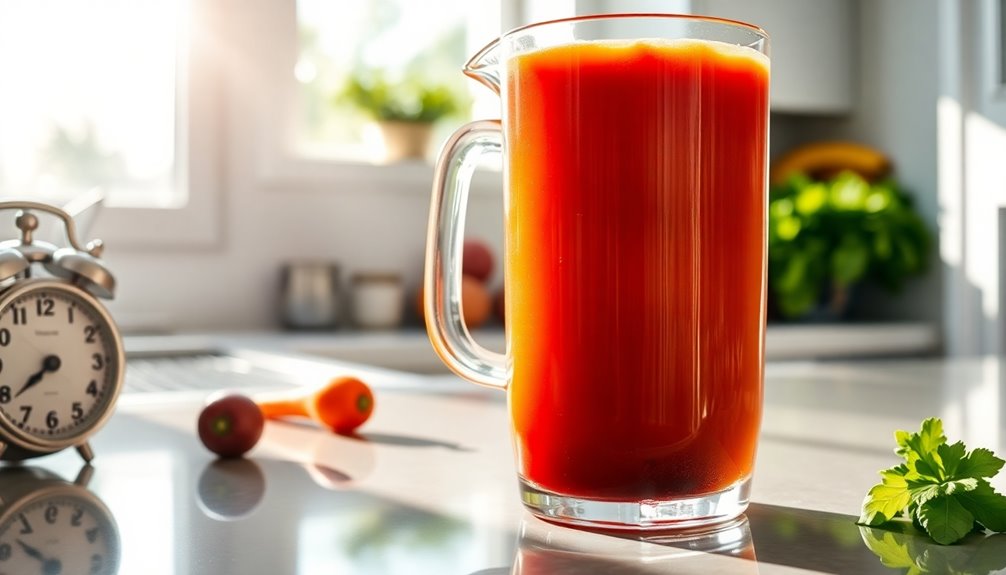
How long can you expect fresh vegetable juice to last? Typically, it lasts in the fridge for about 24 to 72 hours, with ideal taste and nutrient retention occurring within the first 24 hours.
If you use masticating juicers, you can extend the shelf life to about 48 hours. For even longer freshness, twin-gear juicers may keep your juice fresh for 4 to 5 days.
To maintain the freshness of vegetable juice, store it in airtight glass containers, as this helps minimize the oxidation process. Additionally, adding acidic ingredients like lemon juice can slow down oxidation and enhance preservation. Fresh herbs can also be included in your juice for added flavor and nutrients, which may contribute to a more enjoyable drinking experience.
Factors Affecting Fresh Juice Longevity
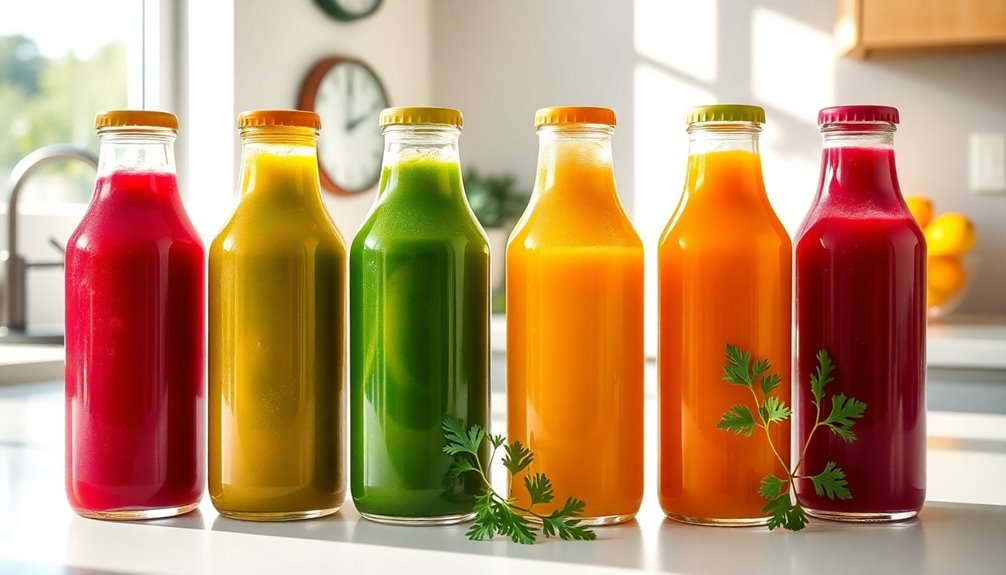
Several factors can greatly impact the longevity of your fresh vegetable juice. The type of juicer you use matters; masticating and twin gear juicers can extend shelf life considerably compared to centrifugal juicers. Additionally, the freshness of your vegetables plays an essential role—organic produce retains more nutrients. Using airtight containers, like glass, helps minimize oxidation, while proper refrigeration (35-40°F) slows degradation. The acidity of your juice is another key factor; highly acidic juices last longer. Regularly consuming juices rich in vitamins A, C, and E can also contribute to overall health and may enhance the benefits of your fresh vegetable juice.
Here's a quick overview:
| Factor | Impact on Freshness | Tips |
|---|---|---|
| Juicer Type | Affects longevity | Choose masticating or twin gear |
| Container Material | Reduces oxidation | Use glass airtight containers |
| Temperature | Slows degradation | Keep between 35-40°F |
| Acidity | Preserves freshness | Add citrus to your juice |
Best Storage Practices for Fresh Juice
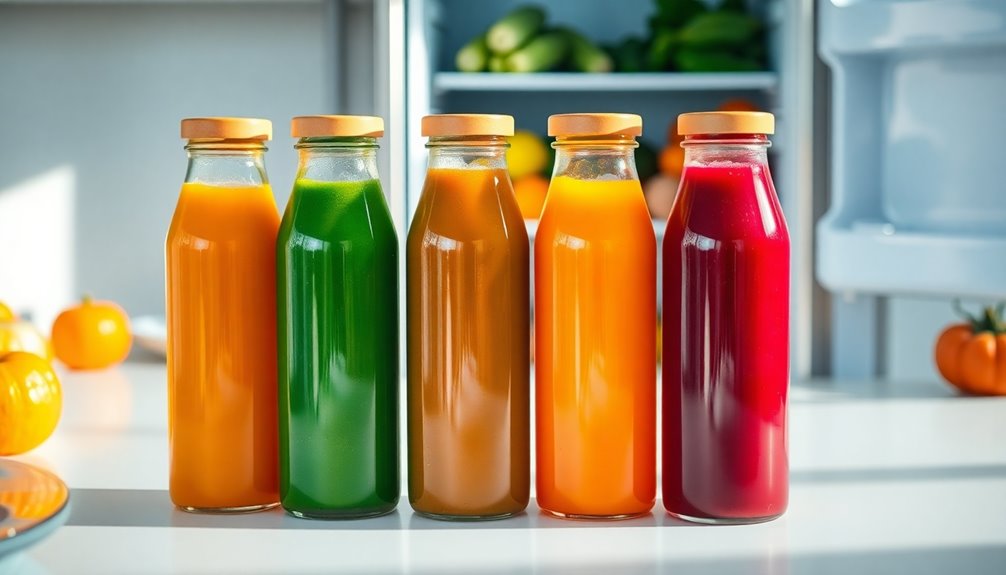
To keep your fresh vegetable juice tasting delicious and packed with nutrients, it's essential to follow best storage practices. Here are some tips to guarantee you store fresh juice effectively:
- Use airtight glass containers to minimize oxidation.
- Fill containers to the brim to reduce air exposure and maintain flavor and nutritional value.
- Keep your fridge temperature between 35-40°F (1.6-4.4°C) to slow degradation and prevent bacterial growth.
- Add a splash of lemon juice as a natural preservative to extend its shelf life.
If you want long-term storage, consider freezing fresh juice, which can last up to six months.
Just remember, for peak taste and nutrition, drink your juice within the first three months!
Choosing the Right Container for Juice Storage
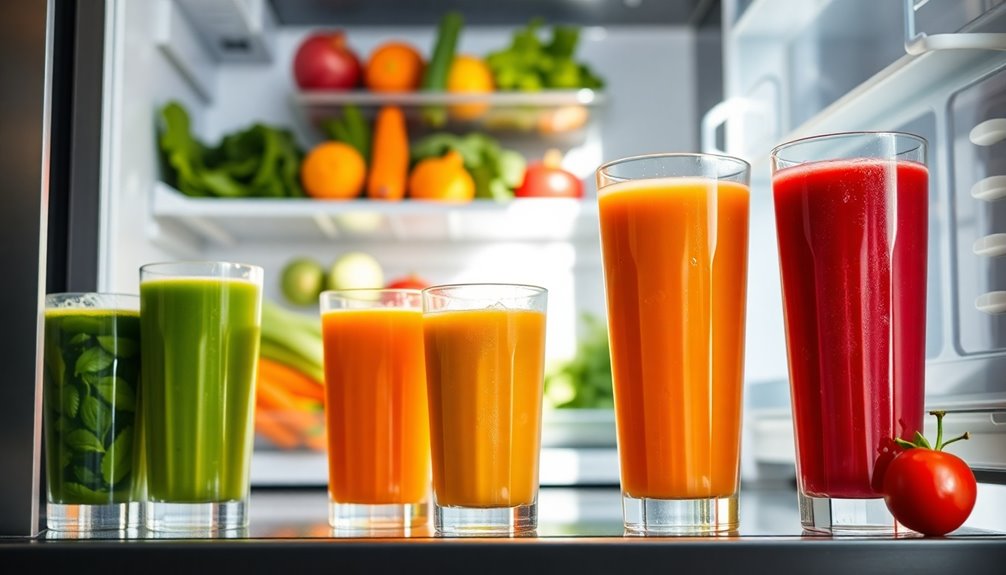
When it comes to storing fresh vegetable juice, choosing the right container is essential for maintaining its flavor and nutritional value. Glass containers are your best option since they're non-reactive and help preserve taste better than plastic.
Make sure the containers have airtight seals to limit juice exposure to oxygen, which can speed up nutrient degradation and spoilage. Opt for opaque or dark glass containers to shield your juice from light, as this can degrade sensitive vitamins like Vitamin C. Additionally, storing your juice in dark glass bottles can further protect its quality, similar to how essential oils should be stored.
When filling containers, fill them to the brim to reduce air space and minimize oxidation, ensuring your juice stays fresh longer. Avoid aluminum containers, as they can react with the juice's acidity, altering its taste and safety.
Tips to Maximize Nutrient Retention in Juice
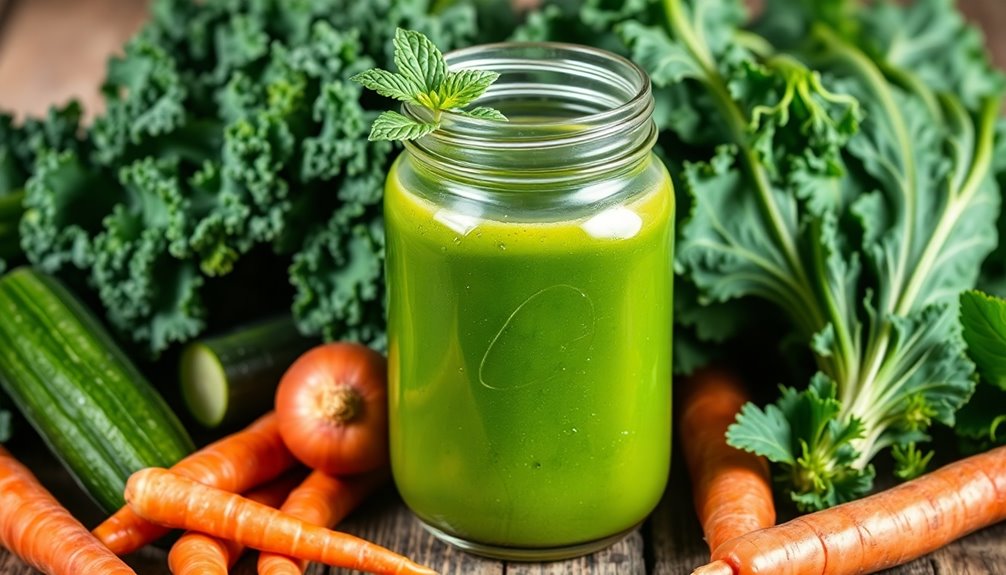
Maximizing nutrient retention in your fresh vegetable juice is essential to enjoying its full health benefits. Here are some tips to help you keep your juice fresh and preserve its nutritional content:
- Use a cold-press juicer to retain up to 90% of nutrients compared to centrifugal options.
- Store juice in airtight glass containers to minimize oxidation and extend shelf life.
- Refrigerate your juice at ideal temperatures between 35-40°F (1.6-4.4°C) to inhibit bacterial growth.
- Add citrus fruits, like lemon juice, as a natural preservative and antioxidant to enhance freshness.
- Incorporating omega-3 sources in your diet can further support overall health, complementing the benefits of fresh juices.
Freezing Fresh Juice: What You Need to Know
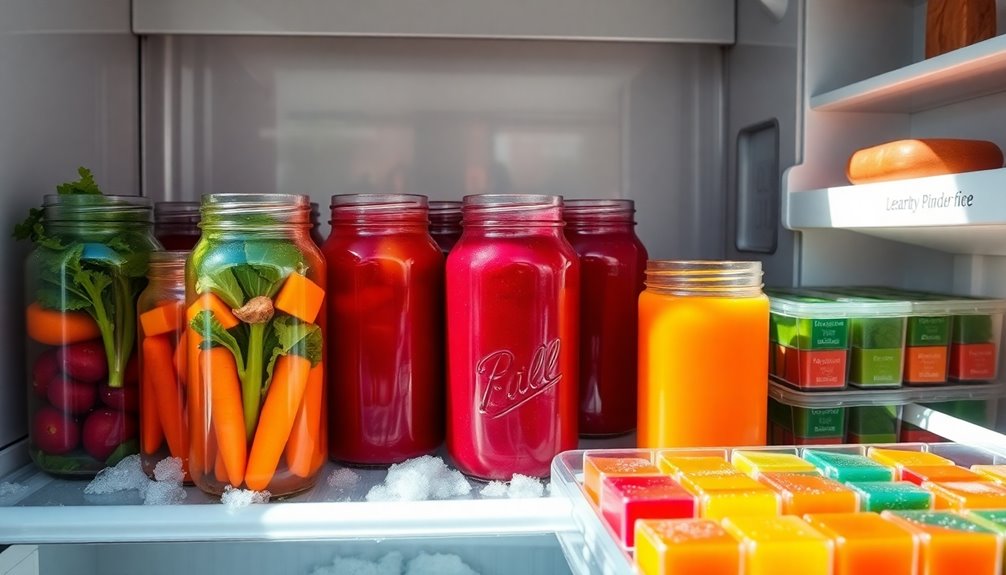
Freezing fresh juice can be a game-changer for preserving its flavor and nutrients, especially if you want to enjoy your healthy concoctions long after they've been made.
By freezing fresh juice, you can extend the shelf life to 12-16 months, which is far superior to refrigeration. To make the most of this, store your juice in airtight glass containers or vacuum-sealed bags to reduce oxidation and maintain quality.
It's best to divide the juice into small portions, making defrosting easier and minimizing waste. Remember to leave some space at the top of containers to allow for expansion.
For peak taste and nutrition, try to consume frozen juice within 2-3 months after freezing to guarantee you're enjoying it at its best. Additionally, fresh juice should ideally be consumed within 24 hours if stored in the fridge to maximize its nutrient density.
Frequently Asked Questions
How Long Does Fresh Vegetable Juice Last in the Fridge?
Fresh vegetable juice lasts about 24 to 72 hours in the fridge.
You'll notice it tastes best within the first 24 hours.
If you use a centrifugal juicer, your juice might only last up to 24 hours, while a masticating juicer can extend that to 2 to 3 days.
Store your juice in airtight glass containers and consider adding lemon juice for extra preservation.
Keeping it at the right temperature is essential, too!
Can You Drink Fresh Juice After 5 Days?
You've got a bottle of fresh juice sitting in your fridge, but it's been five days. Should you take that risk?
While it might still be drinkable, you're playing a game of chance. Spoilage signs like a sour taste or odd color could be lurking.
For the best flavor and nutrients, you should stick to consuming it within 72 hours.
If you're unsure, it's wiser to toss it and blend a new batch!
How to Know if Fresh Juice Is Bad?
To know if your fresh juice is bad, trust your senses. If it smells putrid or has a sour taste, toss it out immediately.
Look for a brown layer on top, which indicates oxidation, or any cloudiness and separation in the juice. These changes can signal spoilage.
When in doubt, it's better to be safe than sorry. Discard any juice that seems off to avoid potential health risks.
How Long Can You Keep Fresh Celery Juice in the Fridge?
Fresh celery juice can feel like liquid gold, but it won't last forever in your fridge. You should aim to drink it within 24 hours for the best taste and nutrients.
If you store it properly in an airtight glass container, it can last up to 48 hours. For longer storage, try freezing it.
Adding lemon juice can also help extend its shelf life, thanks to its natural preservative qualities.
Conclusion
To sum up, while fresh vegetable juice might only last a few days in the fridge, don't let that discourage you from enjoying its benefits. You might think it's too much hassle to make juice regularly, but consider the vibrant flavors and nutrients packed into every glass. By following proper storage practices and using the right containers, you can savor the freshness and maximize your health. Embrace the process, and your body will thank you for it!
Cindy thoroughly researches juicing trends, techniques, and recipes to provide readers with practical advice and inspiration. Her writing style is accessible, engaging, and designed to make complex concepts easy to understand. Cindy’s dedication to promoting the advantages of juicing shines through her work, empowering readers to make positive changes in their lives through the simple act of juicing.

